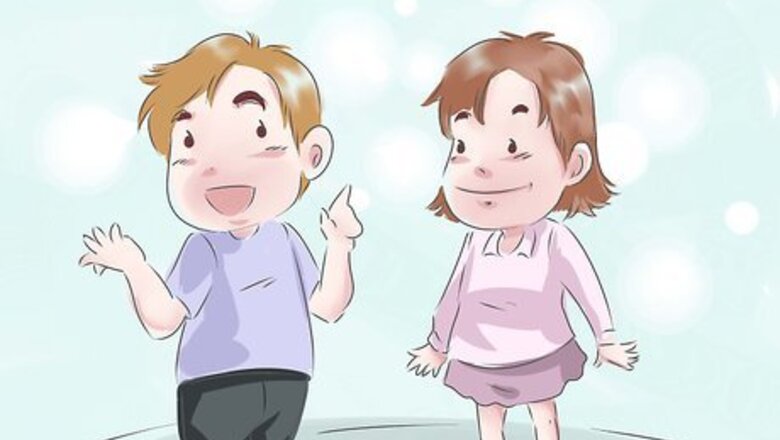
views
Being Likable
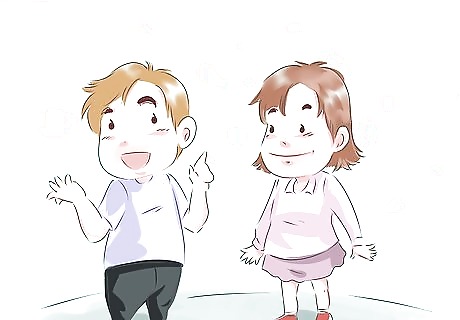
Be cool with yourself. The more you find your interests and do them and are happy about it, the more likely people are to also find you interesting. Don't be scared to have a conversation about your hobbies, but don't hog the conversation either. If you're sweating meeting new people, if you're thinking about how awkward, lame, and embarrassing your last comment about ferrets was and how these people are never going to want to see you again, it will show. The solution? Stop. People are generally harmless and too wrapped up in what they're saying to notice much else. If you never see them again, it is not the end of the world. There are many other people on this planet looking for friends, too.
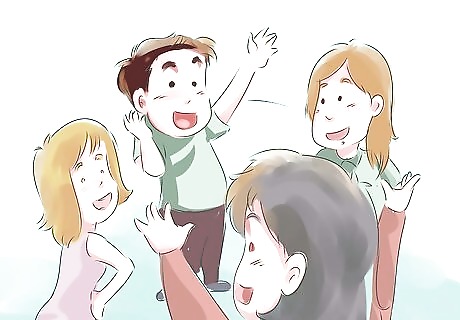
Be friendly. If you're not out there being friendly, people will assume that you're just not interested in being friends. Most humans are pretty easily intimidated and like a sure thing; if you're not receptive, warm, and give off those friendly approach-me vibes, they won't come knocking on your door. And since this is a concept you've been taught since before you could practically walk, you know exactly what we're talking about. Be willing to listen. Even if ancestry research isn't your thing, be willing to listen and ask questions. More likely than not, you might find a new interest.

Smile. Greet the people you meet by smiling. It's a friendly gesture that attracts people, shows them you're engaged in your surroundings, and looking to have a connection. Can you imagine trying to befriend a stranger you see grimacing in the corner? No thank you. Make it less nerve-wracking for potential buddies by opening up and exuding warmth. Maintain open, inviting body language. When you find yourself amongst people, try to keep your body aligned with theirs (and not toward the door, for example). Keep your arms open and stay off your phone. There are people out in the real world that deserve attention!

Get people talking about themselves. Too many of us blame the fact that they get tongue-tied and never really know what to say to account for the lousy social skills, when really it's listening that is the more important of the two abilities. People seek friends who will care to listen to what they are saying more than anyone who can talk circles around them. If talking isn't your specialty, you will be just fine without it. Ask questions. Everyone loves being asked questions and it takes the spotlight off you! Open-ended ones, especially. A one-word response (yes or no) doesn't really take the conversation anywhere and puts the pressure on you to follow up, so ask ones that require elaboration.

Remember details about them. How impressive is it when you meet someone once and the next time you run into them they ask you about your birthday, your mom, or some other little tidbit you casually mentioned in passing? It feels so good knowing someone paid attention to you and valued the information you told them. Be that person! Winning friends is all about making the other person feel good. You can notice details, too. If there's anything they're wearing, carrying, or have about them, ask! Who knows the interesting conversations this could launch?

Put your shyness and insecurity on the back burner. People naturally gravitate toward confidence. If you're clingy, they'll all be headed for the hills in no time at all. No need to be cold, but know that whatever your audience's opinions of you are, it doesn't really matter. Be you. That's the best self you can be. Easier said than done, isn't it? Overcoming insecurity is a process some people never get through. But a large part of it is positive thinking. If the insecurity thing seems a little daunting, try focusing on that aspect instead.
Meeting People

Go to all sorts of places. The only way to meet people once you get out of high school and college (and those are people you're thrown in with anyway. How many of them do you like) is to get out and do stuff outside your home. The more you do, the more interesting you'll be and the more (interesting) people you'll meet. That's a cold, hard fact right there, that is. All sorts of places. Even places you initially wouldn't see yourself going to -- those are the places you always get the most surprised about! Make it a point to check out that cafe you've heard about. Check out that abstract Jell-O art exhibition. Go to your little sister's softball games for a change. You'll have so many stories to tell by the end of the week that making conversation won't even be an issue.

Get out and go places. The more places you go and activities you go (such as going to Jell-O art exhibitions), the more interesting you'll be and the more varied your perspective on the world will be. You'll have seen more things, met more people, and, at the risk of sounding like your hippie aunt in Denver, you'll be happening. And you'll be busy! Busy meeting people, having experiences, and living life, that's what. When people meet you, they'll probably assume a fair number of things. It's your job to take those labels people place on you and tell 'em where to stick it with your dynamic, multi-faceted self. Are you a leggy blonde? Well, maybe you're into magazines and The Bachelorette. Oh crap, you're also a sharpshooter? Woah! Do you only wear flannel and listen to Neutral Milk Hotel? Oh...hold up, you also speak Russian and studied French cooking? Cool.

Draw on your current contacts. If you have even one friend under your belt, you have access to a ready-made social network. Heck, your coworkers, your neighbors, your cousins -- they all know people you could win over. Take advantage of them! Invite them to a get together and have them bring along a couple friends. Attend recitals, festivals, and other public events that they're going to. Put your connections to work! This is also a good way to turn acquaintances into friends. Let that coworker who you talk to once in a while that you know is into red wine that you're looking to get into it too. Do they have any suggestions? Talk to your neighbor about their garden -- how do they do it? Before you know it, you'll be going to wine tastings and joining your neighbor's book club. Maybe getting roped into babysitting, too, but it's worth it!
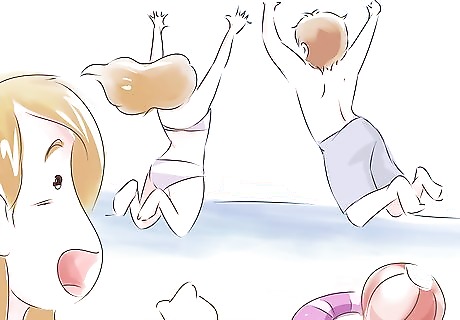
Know that you never know. That's a terse way of saying, "Go do things where you don't expect friendships to bloom because that's when they happen." Your little cousin's soccer tourney? Sure, why not? Open mic night at a local comedy club? Of course! If you frequent these places, you'll wind up seeing the same faces. And you already know you have stuff in common! Try to figure out what you're looking for in a friendship so no one uses or takes advantage of you.
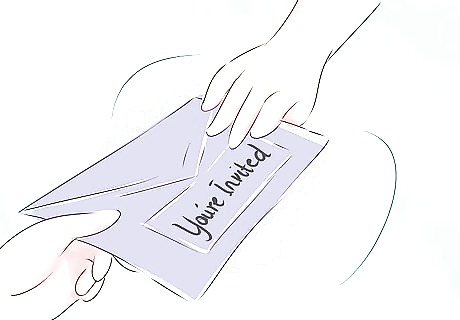
Accept invitations. Because if you don't, you'll stop getting invited at all. So while in the back of your head you're totally thinking, "Ugh, this is going to be such a drag," you may want to stick it out. The party might suck, sure, but you could meet someone there who thinks it sucks, too. You might not be the biggest beer, volleyball, or country music fan, but accept anyway. If it really stinks, you can always leave. If you're convinced you're going to have a terrible time, you're going to. So don't waste your time going to places that put you in a bad mood. Instead, try to open up your mind to the possibility that it could be fun. And if not fun, it'd at least be an experience. What's the worst that could happen? It sucks and you leave. What's the best? It's awesome, you've met people, and you've found something you really enjoy. How's that weigh out?

Initiate. Heads up: we're all nervous when it comes to meeting people. It's so much easier just to live in our world and wait for people to come into it. But the problem arises when everyone does that; so take one for the team and do the initiating yourself. People are warm and polite (usually) and they won't reject you in any sort of embarrassing fashion. The worst that could happen is they make quick small talk and go on their way. Nothing lost there. In its own crazy way, initiating is terrifying. To make it seem simpler, focus on one thing: making a situational comment. That's all it takes! In line at the cafe? Talk about coffee, the wait, or getting your caffeine fix. At a party? The host, the food, or whoever's off making an idiot of themselves. The conversations can only bloom from there.

Get contact info. All too often people meet and have a good time and both parties would be willing to be friends, but no one makes the effort. It might have to be you that steps up to the plate. Ask for their Facebook name, their cell number, or in some circumstances, their email. And then use it! If you've had a good, interesting conversation, don't worry about coming off creepy. A simple, "Hey, what's your Facebook name?" or, "Let me get your phone number so we can go to that Jell-O exhibition sometime" will do the trick. No need to make mountains out of molehills! If you're cool and casual, there's nothing to refuse.
Making Connections Last
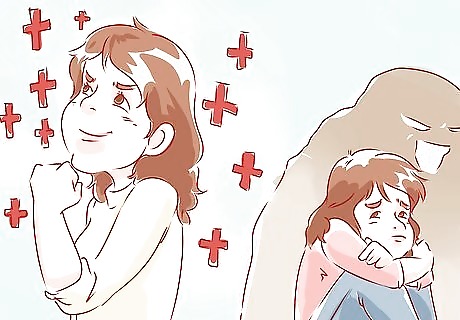
Stay positive. When we're first forming friendships, it's important to keep our interactions positive and friendly. If you don't, you risk being that guy or girl who's always such a "Debbie Downer," the one who has a negative spin on everything. New friends are the ones you laugh with, not the ones you cry on...yet. Commiserating is a powerful tool, yes. Having a common enemy can bring two parties together, and shared negative feelings can be very, very cohesive. But it's generally best to save this for when the relationship is a bit sturdier. Start gossiping later, when you both know each other well enough for it to be light and as well-meaning as possible. You can bond over your boss's ridiculous getup or Sally's "pregnancy" when the time comes.

Ask for advice. Talk about heavier and more serious topics. A level of trust has to be ascertained for that bond to go beyond the watercooler. To start that train chugging away, ask for advice. Bring up a little problem in your life and seek out their opinion. They'll feel important and important to you, making them like you that much more. And maybe they'll return the sentiment! Examples are what coffee maker to purchase or where to go when you're on vacation in New Zealand, maybe how to deal with an annoying roommate -- not how to deal with your life-threatening disease. It needs to be a topic the other person feels like they can handle, you know? Something they can weigh in on that will be of benefit to you; you want them to walk away feeling useful, not overwhelmed.

Put the work in. Just like keeping your body or mind in shape, you gotta keep your relationships in shape, too. Once they've been achieved -- you're hanging out occasionally, you're starting to be comfortable around each other -- don't let them dwindle and fade! Send the random text about something funny you saw. Invite them out for coffee, to a party, or to some public event you think they might enjoy. And when your new friend is having a hard time, be there for them. Part of being a friend is sacrificing some of your time. If they ever need a favor, help out if possible or reasonable. If they need a shoulder to cry on, be there! Let them know that you care. Friendships aren't always sunshine and rainbows; sometimes they take a little TLC to flourish.
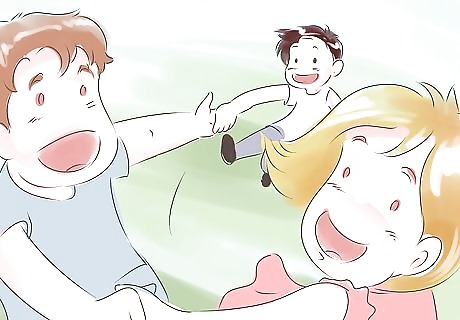
Never take it personally. The older we get, the more and more plates we're spinning simultaneously. If you don't have any that are dropping, you're doing it wrong. In other words, people are busy. People have lives to attend to. If your friendship isn't at the "OMG WE'RE BFFLs(!)" level, it's fine. You have your own life to lead, too. If you can make each other's lives better from time to time, that's good. That's all you need.

Be a good friend. No friendships will last if you don't treat the other person well. Once you get to know each other, it's not enough to be friendly -- you have to be a good friend: someone who clearly cares and is worth spending time with. You get out what you put in, really. So if you want someone who trusts you, who makes time for you, who makes life feel good, you gotta do that for them. Being a good friend in fair weather is nice, but being a good friend when times are hard is even more important. If your friend is sick you don't have to rush over with a bowl of chicken soup, but do text them how they're feeling and if they need anything. If they're having an issue, let them know you're there for them. And when it's your turn to feel down, hopefully they'll be right alongside you, too.












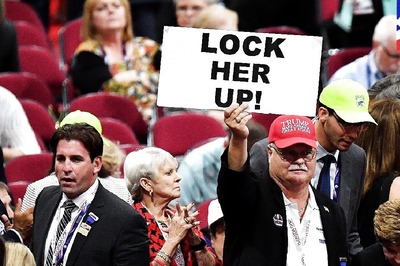







Comments
0 comment